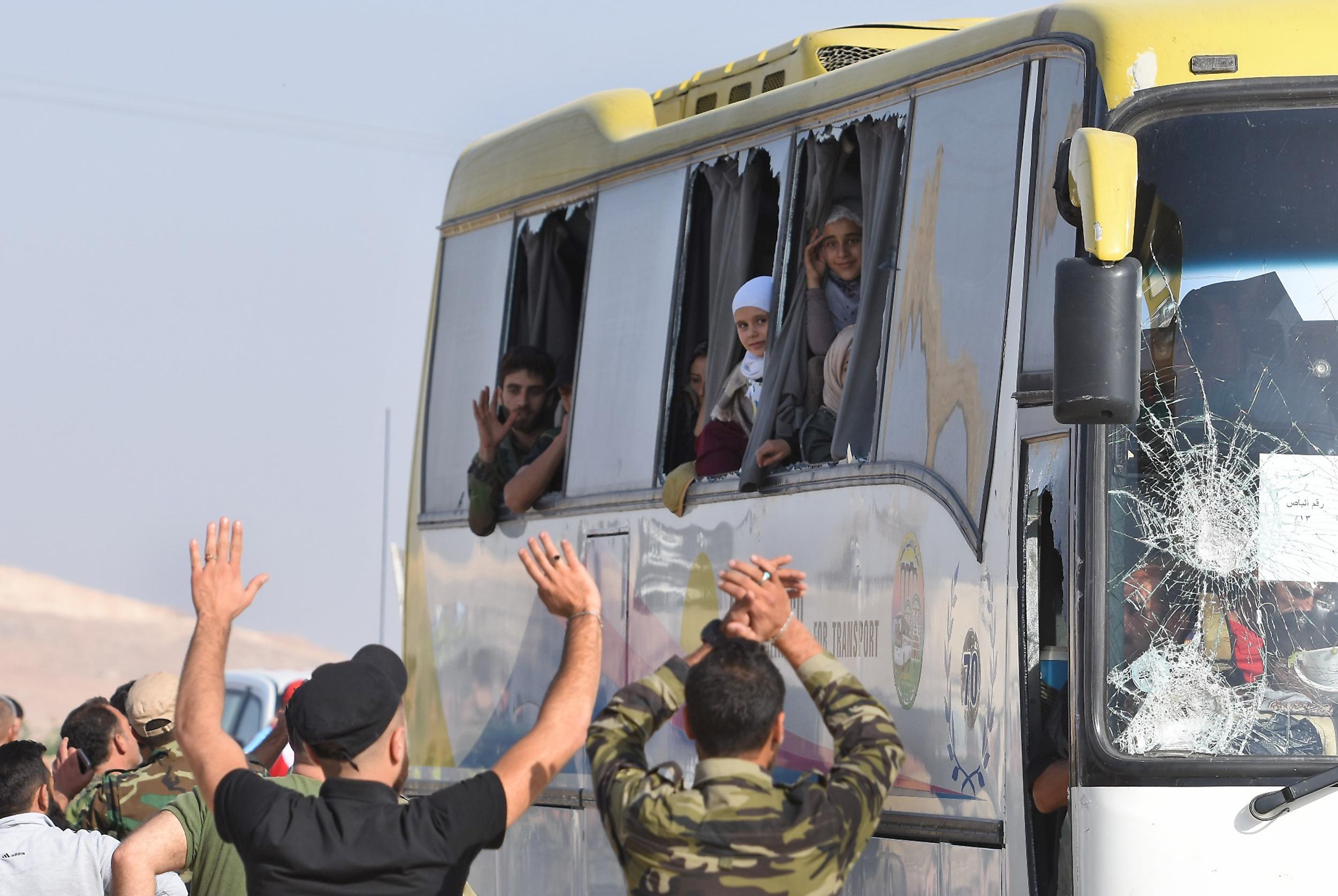Syria conflict: Last besieged towns of the war evacuated in return for prisoner swaps
Men released from Assad jails under deal to free villages besieged by rebels in Idlib province show horrific signs of maltreatment

Your support helps us to tell the story
From reproductive rights to climate change to Big Tech, The Independent is on the ground when the story is developing. Whether it's investigating the financials of Elon Musk's pro-Trump PAC or producing our latest documentary, 'The A Word', which shines a light on the American women fighting for reproductive rights, we know how important it is to parse out the facts from the messaging.
At such a critical moment in US history, we need reporters on the ground. Your donation allows us to keep sending journalists to speak to both sides of the story.
The Independent is trusted by Americans across the entire political spectrum. And unlike many other quality news outlets, we choose not to lock Americans out of our reporting and analysis with paywalls. We believe quality journalism should be available to everyone, paid for by those who can afford it.
Your support makes all the difference.After three years, three weeks and three days of siege, the Shiite villages of Foua and Kefraya in Syria’s otherwise rebel-controlled Idlib province have been handed over to Sunni rebel forces.
Around 5,000 residents and 2,000 fighters boarded a convoy of buses bound for government held territory in Aleppo province on Thursday, in a deal which has supposedly seen the release of 1,500 inmates from regime prisons.
“Kefraya and Foua are empty,” a local Facebook news page posted.
“Nothing remains but memories and the graves of the ancestors and martyrs.”
The small towns had been surrounded by rebels including Hay’at Tahrir al-Sham (HTS), a militia linked to al Qaeda, since March 2015, shelled and shot at by hostile forces and forced to live on insufficient Arab Red Crescent deliveries of medical supplies and food.
A video shared thousands of times on social media showed a well known Egyptian member of HTS, Abu al-Yaqdhan al-Masri, waving off the buses while telling evacuees: “There’s no place for you in Idlib.”
Rocks thrown at the buses shattered their windows along the route.
Their evacuation marks the end of the last siege in a war that has become defined by starvation tactics. Most of the sieges in the seven-year conflict have been carried out by president Bashar al Assad’s forces on rebel-held enclaves of towns and cities.
A 2017 deal to transfer residents from Foua and Kefraya, as well as the rebel towns of Madaya and Zabadani, fell apart after a bombing en route killed 150 civilians from the Shiite towns.
As the latest buses passed regime checkpoints overnight, in an unusual, almost direct swap, the government agreed to release 1,500 prisoners and transport them to Idlib, according to an HTS statement. The northwest province is now the last rebel stronghold in the country.
Rebel-controlled media showed emaciated men arriving in Idlib city on Thursday, with gaunt faces and mutilated arms and legs.
At least 65,000 people are thought to have died in the Syrian regime’s prisons since the war broke out in 2011. Rights groups and UN investigators allege the mistreatment and torture inside such institutions amount to war crimes.
Rumours circulated on rebel news sites, WhatsApp and Facebook pages that many of the arrivals had not come from regime jails but were rebels who had surrendered and agreed to evacuation in ceasefires elsewhere. Local authorities are compiling names and identities.
Some reports say this week’s deal is also supposed to spare Idlib from future government assault, with the province now home to more than two million people, many of whom have been transferred there from other conflict areas.
Idlib is technically covered by a US, Russian and Iranian-brokered de-escalation agreement which went into effect last year, but the Syrian government – with the help of Russian air power – has targeted what it says are terrorist factions not covered by the deal, to retake eastern Ghouta and parts of Homs this year.
The month-long offensive on Deraa in the country’s south, at its peak uprooted 320,000 people, thousands of whom are camped on the borders with Jordan and Israel without adequate shelter or water. Around 140,000 people are believed to be displaced and at least 100 civilians have been killed in shelling and airstrikes.
Partial ceasefire deals have seen rebels in several towns surrender their weapons in return for safe passage to Idlib.
On Friday, the United Nations refugee agency renewed calls for all sides in Syria to allow aid access for civilians displaced by the Deraa fighting.
It also said it was ready to hold talks with Damascus and Moscow on returning some refugees in neighbouring countries to Syria, stressing any returns must be safe and adhere to international standards.
Around half of Syria’s pre-war population of 22 million have been forced to flee their homes – with five million now outside the country – and at least 500,000 people have died in the complex conflict.
Join our commenting forum
Join thought-provoking conversations, follow other Independent readers and see their replies
Comments